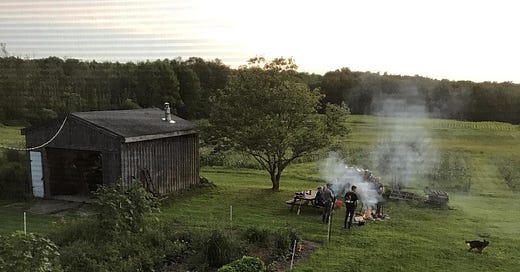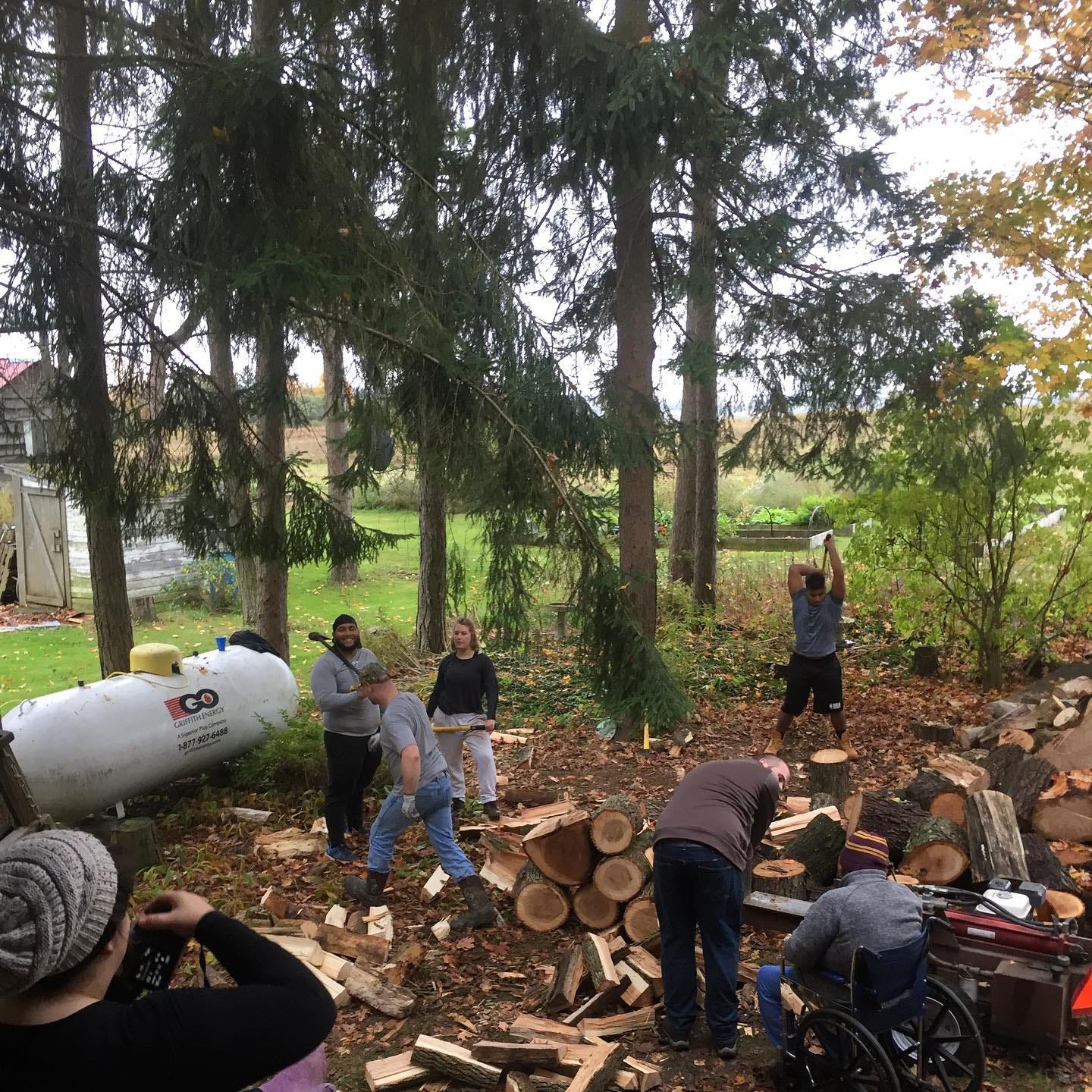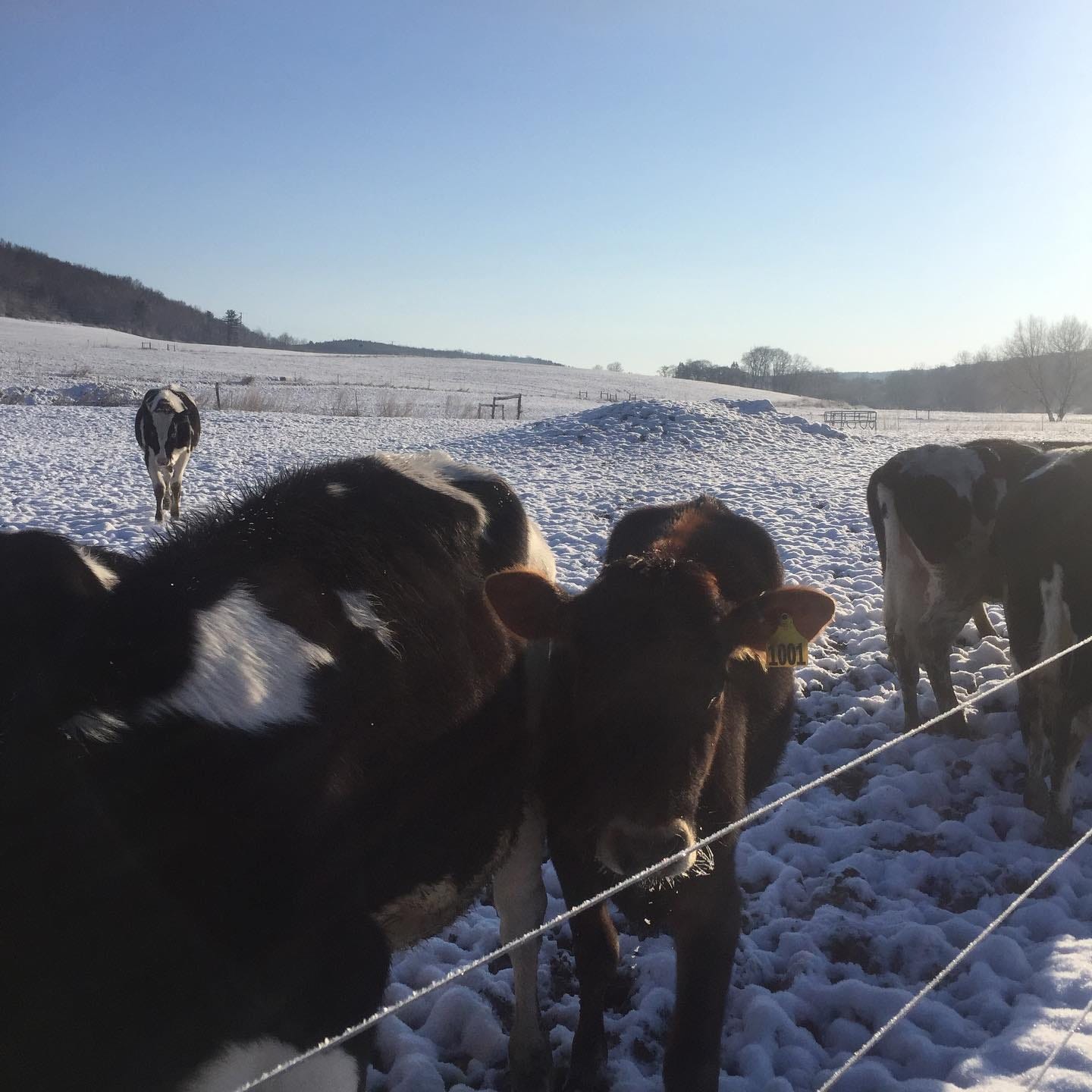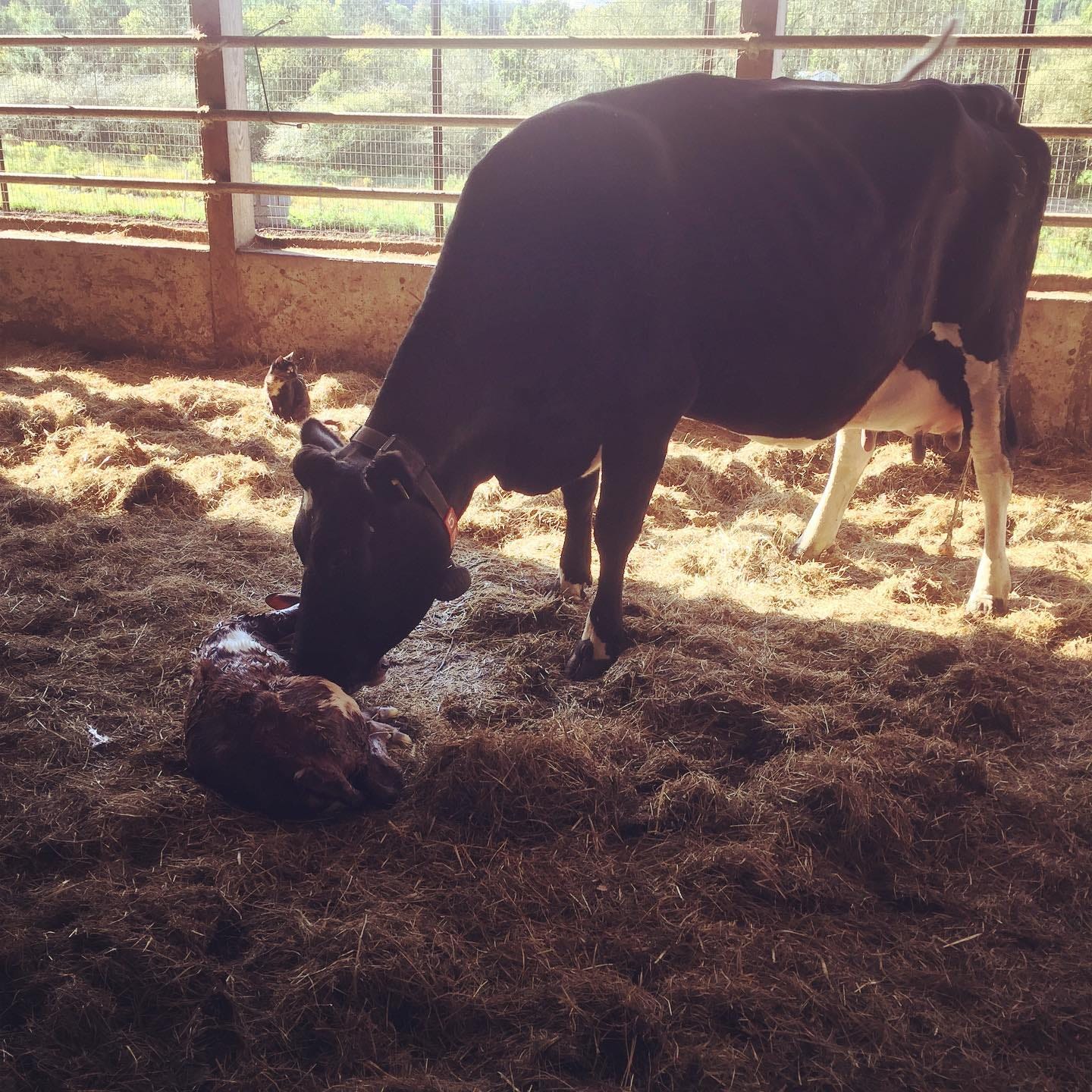Welcome to Lady Agrarian. I’m Emma, writer and farmer, wife and homemaker. Pull up a chair to the fire and let me fill your cup with something good. As always, I hope you find nourishment here.
My sister and I were driving home from our friends’ house late on a snowy Pennsylvania night. We were climbing a hill when suddenly I felt my tires doing a crazy dance beneath us, and the steering wheel jerked from my hands. I barely had time to notice what was happening when an invisible force pulled the truck off the road and we plunged into the ditch.
We stopped our giggling. The snow made a nice cushion, and we were completely fine. An ordinary occurrence in those parts, only a minor emergency. But we were still an hour from home, and we weren’t likely to get out of this fix without some help.
We had slid off the road right in front of a house, the first blessing.
Should we go to the door? It was after 10 o’clock, but lights shone through the curtains. At the height of my fire department days, I was very used to going up to strangers’ doors, but it was usually because they needed help — not me.
A woman answered my knock right away. She was gray and sweet and soft. My words must have come out in a tumble. So sorry to bother you so late…the roads are icy…we slid into the ditch in front of your house.
I hadn’t even gotten to the part about asking if they had a chain or knew somebody who could pull us out. “He’s coming,” the old woman said. And behind her, rising from his chair, her husband went to get his coat.
The old man worked wordlessly. He hooked a heavy chain onto his Chevy and pulled my sad truck back onto the road with remarkable ease. But there was still the problem of making it to the top of the hill. The pavement was so slick you could barely walk on it. The other side of the road had been salted, he said, because he had seen the trucks go by. But not the side we were driving on.
“I’ll drive up there and make sure nobody comes,” he said. He drove to the crest of the hill to keep watch, and I drove up on the left side of the road, carefully and gratefully.
“I don’t know how to thank you!”
He waved his hand and smiled. “No need.” Then he joked about giving him a kiss as payment — I wish I could remember now what he said, but I can’t. I do remember thinking, what would we all do without sweet old grandpas like this? And how I would never be able to repay this old couple, because I would never learn their names.
This is the rural economy in which I was brought up. Have you ever heard of it? I can tell you how it works.
A neighbor helps you put up hay, so you feed him a good supper. Another lends you his bull for breeding, so you pay him with a bowl of strawberries. Your mechanic down the road stays late at the shop to finish working on your truck, because he knows you have to leave for college tomorrow, so you bring him a plate of dinner. Things come to be through hand-shake deals, this-for-that, and it’s a good practice to bring a jar of flowers for the woman of the house when you come for a visit. Favors are returned and debts are made whole through goods or services, and not with paper.
Quite often, though, the balances remain unequal. Debts cannot be paid, because the good deeds are done in passing, and you’ll probably never meet again — just like my sweet old gentleman and his truck and chain. Or maybe the favor is so great that you have nothing of equal value to give. It is an economy based on generosity, and the goodwill of neighbors and strangers alike.
Once I got a flat tire on the highway and limped to a gas station, where a whole family of rednecks volunteered to put on the spare. (I call them rednecks only because I’m fairly certain they wouldn’t object.) I had no cash with me, only a loaf of bread I’d bought at the farmer’s market that morning, so I gave it to them. It wasn’t an equal exchange by any means.
The rural economy is more than an exchange. Often it’s giving for giving’s sake. The events of life bring all sorts of reasons to give these gifts, times of joy and times of sorrow — a comforting meal for a family suffering a loss, a bouquet of fresh flowers for the birth of a baby, or just a small token of appreciation in the form of a package of spare ribs, a jar of maple syrup, or a bright geranium. It was my mom who taught my sisters and I to give gifts to our Sunday school teachers, our music teachers, our hosts, even our mechanics. I do this now because I need to — it’s ingrained in me. Gifts are poured out in abundance within the rural economy, even when there isn’t a particular reason to give. The joy of spreading it around is reason enough.
There is an episode of the show Northern Exposure1 where an IRS employee comes to Ruth Ann’s store to conduct an audit. The woman is concerned to find that much of Ruth Ann’s business is done off the books. She’s been trading merchandise for beaver pelts, receiving farm implements back from people when they can’t make the payments, and letting folks wash her windows when they’re hard up for cash to pay their grocery tab. Worst of all, she isn’t keeping written records of any of these things.
“What is the big deal?” Ruth Ann says. After all, she’s been doing this for years. Her business is kept flowing by this unspoken understanding, and the only record that needs kept is the neighborly bonds that form between these customers and friends.
Ruth Ann and Amy, the IRS agent, spend time going over the accounts. It turns out that Amy, who is embroiled in her own family drama, needs a friend to pour out her woes. She ends up spending the night on Ruth Ann’s couch. It’s easy to see how this woman, after taking comfort in Ruth Ann’s hospitality, begins to understand a little more clearly how things work in this town, and why she can’t tell Ruth Ann to completely abandon her business practices. After all, we all know — don’t we? — how much it means to be a stranger and have someone extend the hand of friendship. These things can’t be added up in terms of money.
I’ve never washed windows for groceries, but I have babysat and gotten paid in pounds of butter. (And I would definitely do this again, should I be asked.) I have been in receipt of these kind gestures so many times. These are things I have kept in my heart for years — like the time my friend left chicken soup and muffins in my truck in the early morning before I drove home for my grandma’s funeral, and the time a couple from church lent me their car when mine was being worked on, and the more-than-twice my little Ranger has been pulled out of snowy ditches by kind men on tractors. My life, much like yours, has been marked by these acts of plain goodness.
Nobody is doing these things to be noticed or praised or rewarded. This is just the economy of dependence and giving in which we are content to operate. It doesn’t really make sense until you become part of it.
Perhaps I should call it the “neighborly economy”, I wondered, realizing as I was mulling all this over that I can’t exclude urban dwellers. Just because I don’t see the same exchange flourishing in those places doesn’t mean it isn’t happening. I heard someone recently talk about the “rural economy” by this name, and to me, it rings true. The woods and the hollows and the back roads are the places I’ve been treated like a neighbor and a friend, where I’ve learned to give from being given to. Maybe you don’t find city dwellers lending one another their bulls for stud services. But they must have their own methods of neighborliness; they’re not so different from us. If I ever start to think they are, I’ll have lost sight of something very important.
Still, it isn’t the same in a city — it doesn’t appear to be, to me. The distrust that prevails there — with good reason — keeps me from lowering my guard enough even to hand out smiles to the people I pass on the street. A smile feels like a trust I’m not ready to give. There are so many people in the city, too many to begin to consider my responsibility to them all as a neighbor, a friend. That is not my community. They ask nothing of me, so why should I give?
Except they do ask. Nearly every day a different person stands at the end of the highway exit with a cardboard sign, asking for something. But sometimes I don’t believe him. I wasn’t raised in the city, and I don’t know if I should.
But there was one day I was driving with my friend Lia, who was raised in the city. We found ourselves stopped at a light where a woman was standing in the median. “Grab my bag from the backseat,” Lia told me. I handed it to her, and she pulled out a small baggie with a bar of soap, a granola bar, and a tiny Gospel. She handed it to the woman out the window.
“What’s your name?” my friend asked. “So we can pray for you?”
The trust required for a handshake will take time. I wouldn’t lend you my bull or my rabbit buck if I didn’t trust you to take care of him. But a cup of cold water is easy enough to give. When I pass a stranger on the city sidewalk, I must remember this — “Truly, I say to you, as you did it to one of the least of these my brothers, you did it to me.” And take it to heart, just as it was meant.
In her memoir, Uprooted: Recovering the Legacy of the Places We’ve Left Behind, Gracy Olmstead pays beautiful homage to her ancestors who lived and farmed in rural Idaho. She tells the stories of her great-grandparents who came to the valley from other places, searching for prosperity and ready to send their roots down deep. These folks whole-heartedly became part of a new community where they raised their family, poured their heart’s blood into their work, and continuously gave back to the land and its people in a way that became a family legacy.
While there were many things I appreciated about this book, the graceful (not meant to be a pun) and loving storytelling of her grandparents’ lives was my favorite part. I loved reading about how the farm families in those days would help one another with haying, harvesting, and building projects. This kind of thing gives me a powerful nostalgia. I, like Gracy, don’t have to go far back to discover the qualities of hard work and devotion to family, land, and neighbors. I can see it in the lives of my parents today, and in my grandparents’ lives, three of which I was fortunate enough to know while they were still here.
We used to joke that every car ride with Grandma and Grandpa was a history lesson, because Grandma liked to point out who lived in the houses, who had lived there before, and interesting things about those people, how they fit into the patchwork of the community and our own family’s lives. We were intertwined because they cared about other people.
I remember my Grandma fussing whenever my mom would try to pay her for something. I would find the offered money in my coat pocket or my bag when I left their house, snuck in there by a shrewd woman who would not be made to operate by the world’s balances, even to the point of exasperation.
I am beginning to understand why.
“Life was a given thing: poured out and then offered back in a list of dependencies and debts so long, it could never be settled. It was never meant to be.”
- Uprooted: Recovering the Legacy of the Places We’ve Left Behind, chapter 10, page 179
At its core, this human economy — rural, urban, and otherwise — is based on the best you and I have to offer, freely given and gratefully received. In fact, it is a part, and not a small one, of what sets those in Christ apart from the world. “They will know we are Christians by our love.” Jesus says in the gospel of John:
“A new commandment I give to you, that you love one another: just as I have loved you, you also are to love one another. By this all people will know that you are my disciples, if you have love for one another.” (John 13:34-35)
To receive the Gospel itself is something that requires abundant grace. This is something that is astonishing, even appalling, to sinners when encountering the Good News of Jesus Christ. You mean to say… I cannot do anything to earn His grace? It would make more sense if God’s favor could be earned. It would perhaps make one feel better about themselves, if only for a time. Yes, it would make more sense…but eternal life with Christ would be forever out of reach, and thus we would be doomed to a temporary life of frustration, confusion, and ultimately despair. This debt cannot be paid back; it was never meant to be.
Like Valjean’s disbelief at the bishop’s kindness, we are all flabbergasted at the great mercy of God in this economy of love .2
Understanding divine grace in my life is something like a hazy picture of blue mountains far off in the distance, coming into focus as I come nearer. You have given me grace, Lord, to save me — now give me grace to accept that it’s nothing I have secured for myself, and nothing I can ever earn or repay.
One summer, I milked cows. I lived in a camper in the farm family’s barnyard. Their nine-year-old daughter became my instant friend. I don’t remember who started the game — maybe I gave her a hair ribbon I didn’t want anymore, or she gave me one of her fairy garden cactuses for my window. But it became a game between us, turning into a race to outdo one another in giving these tiny gifts. She left bundles of wildflowers on my doorstep, and I tried to sneak little trinkets into the house and leave them places where she would be surprised to find them. “I beat you,” she’d say with a satisfied grin, and I’d know something else would be waiting for me when I went in that night — maybe another plant, a pouch of honey candy, or a bracelet. She was very fast, and had, in fact, usually returned my gift with a gift of her own before I could think of what to leave for her next.
But that was the beautiful thing about the game — you couldn’t be beat. You could only keep it going. Just like a debt to a neighbor cannot always be settled — maybe, and quite possibly, it was never meant to be.
None of us deserves this sweetness, yet we are all here to be a part of it — of giving and taking, offering and receiving, thanking, and blowing a kiss as we drive on our way back home in the snow.
the quirky 90s tv show that had such an influence over my adolescence, be it for good or ill
I borrowed this phrase from
and ‘s wonderful episode on Les Miserables. It’s fantastic, have a listen:









What a beautiful post! And thank you for the shout out - glad you enjoyed the episode 🥰